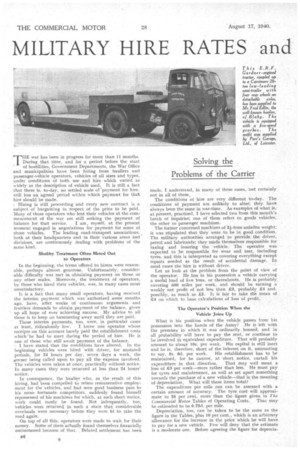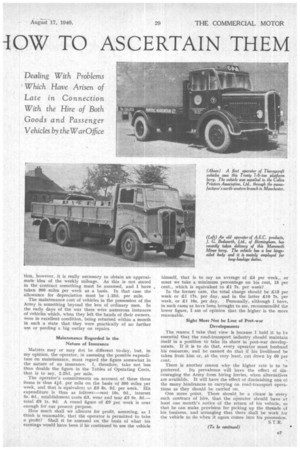MILITARY HIRE RATES and
Page 24

Page 25

If you've noticed an error in this article please click here to report it so we can fix it.
-10W TO ASCERTAIN THEM
' THE war has been in progress for more than ll months.
During that time, and for a period before the start of hostilities, Government Departments, the War Office and municipalities have been hiring from hauliers and passenger-vehicle operators, vehicles of all sizes and types, under conditions of both use and hire which varied as widely as the description of vehicle used It is still a fact that there is, to-day, no settled scale of 'payment for hire, still less an agreed period within which payment for that hire should be made.
Hiring is still proceeding and every new contract is a subject of bargaining in respect of the price to be paid. Many of those operators who lent their vehicles at the commencement of the war are still seeking the payment of balance for that service. I am, myself, at the present moment engaged in negotiations for payment for some of those vehicles. The leading road-transport associations, both at their headquarters and in their various areas and divisions, are continuously dealing with problems of the same kind.
Shabby Treatment Often Meted Out to Operators In the beginning, the terms offered to hirers were reasonable, perhaps almost generous. Unfortunately, considerable difficulty was met in obtaining payment on those or any other scales. Moreover, the treatment of operators, by those who hired their vehicles, was, in many cases most unsatisfactory.
It is a fact that many small operators, having received the interim payment which was authorized some months ago, have, after weeks of continuous arguments and fruitless demands to obtain payment of the balance, given up all hope of ever achieving success. My advice to all those is to keep on hammering away until they are paid.
Those interim payments, too, were, in particular cases
at least, ridiculously low. I know ode operator whose receipts on this account barely paid the establishment costs which he had to meet during the period of hire. He is one of those who still await payment of the balance.
I have stated that the conditions have altered. In the beginning vehicles were hired with driver, for unstated periods, for 24 hours per day, seven days a week, the owner being called upon to pay all the expense involved. The vehicles were taken at once, practically without notice. In many cases they were returned at less than 24 hours' notice.
In consequence, the haulier who, as the result of this hiring, had been compelled to refuse remunerative employment for the vehicles, and had seen good business pass to his more fortunate competitors, suddenly found himself repossessed of his machines for which, at such short notice, work could rarely be found. Not infrequently, too, vehicles were returned in such a state that considerable overhauls were necessary before they were fit to take the road again.
On top of all this, operators were made to wait for their money. Some of them actually found themselves financially embarrassed because of that. Belated settlement has been made, I understand, in many of these cases, but certainly not in all of them, The conditions of hire are very different to-day. The conditions of payment are unlikely to alter; they have always been the same in war-time. As examples of what is, at present, practised, I have selected two from this month's batch of inquiries; one of them refers to goods vehicles, the other to passenger machines.
The former concerned machines of 2i-tons unladen weight; it was stipulated that they were to be in good condition. The military authorities arranged to provide the driver, petrol and lubricants; they made themselves responsible for taxing and insuring the ' vehicle. The operator was expected to be responsible for wear and tear, including tyres, and this is interpreted as covering everything except repairs needed as the result of accidental damage. In most cases the hire is without driver.
Let us look at the problem from the point of view of the operator. He has in his possession a vehicle carrying a useful load of five tons, or thereabouts. He is probably. covering 600 miles per week, and should be earning a weekly net profit of not less than £3, probably £4 and, possibly, as much as £5. It is fair to take tile mean of 24 on which to base calculations of loss of profit.
The Operator's Position When the Vehicle Joins Up What is his position when the vehicle passes from his possession into the hands of the Army? He is left with the premises in which it was ordinarily housed, and in all probability will have to pay the rent, or continue to be involved in equivalent expenditure. That will probably amount to about 10s. per week. His capital is still inert and he is, therefore, short of the interest on it, amounting to say, 5s. 6d. per week. His establishment has to be maintained, for he cannot, at short notice, curtail his expenditure in that direction. That may well mean a loss of £3 per week—more rather than less. He must pay for tyres and maintenance, as well as set apart something towards the purchase of a new vehicle—that is the meaning of depreciation. What will these items total?
The expenditure per mile run can be assessed with a certain amount of accuracy. The tyre cost will approximate to 25 per cent, more than the figure given in The Commercial Motor Tables of Operating Costs. That may be estimated to be 0.75d. per mile.
Depreciation, too, can be taken to be the same as the figure in the Tables, 'plus 10 per cent., which is an arbitrary allowance for the increase in the price which he will have to pay for a new vehicle. Few will deny that the estimate is a moderate one. Before agreeing the figure for deprecia tion, however, it is really necessary to obtain an approximate idea of the weekly mileage. As this is not stated in the contract something must be assumed, and I have taken 300 miles per week as a basis. In that case the allowance for depreciation must be 1.25d, per mile.
The maintenance cost of vehicles in the possession of the Army is something beyond the ken of ordinary men. In the early days of the war there were numerous instances of vehicles which, when they left the hands of their owners, were in excellent condition, being returned within a month in such a state that they were practically of no further use or needing a big outlay on repairs.
Maintenance Regarded in the Nature of Insurance Matters may or may not be different to-day, but, in my opinion, the operator, in assessing the possible expenditure on maintenance, must regard the figure somewhat in the nature of an insurance. I, therefore, take not less than double the figure in the Tables of Operating Costs, that is to say, 2.25d. per mile.
The operator's commitments on account of these three items is thus 41d. per mile on the basis of 300 miles per week, and that is equivalent to £5 6s. 3d. per week. His expenditure is thus as follows:—rent 10s. Od., interest 5s. 6d., establishment costs £3, wear and tear £5 6s. 3d— total 29 Is. 9d. A round figure of 2.9 per week is near enough for our present purpose.
How much shall we allocate for profit, assuming, as I think is reasonable, that the operator is permitted to take a profit? Shall it be assessed on the basis of what his earnings would have been if he continued to use the vehicle
himself, that is to say an average of £4 per week„ or must we take a minimum percentage on his cost, 15 per cent., which is equivalent to 21 7s. per week?
In the former case, the total charge should be 213 per week or 21 17s. per day, and in the latter 210 7s. per week, or 21 10s. per day. Personally, although I have, in such cases as have been brought to me, recommenad the lower figure, I am of opinion that the higher is the more reasonable.
Sight Must Not be Lost of Post-war Developments The reason I take that view is because I hold it to le essential that the road-transport industry should maintain itself in a position to take its share in post-war developments. If it is to do that, every operator must husband his resources, and he cannot do that if his livelihood be taken from him or, at the very least, cut down by 60 per cent.
There is another reason why the higher rate is to be
preferred. Its prevalence will have the effect of discouraging the Army from hiring lorries, when alternatives are available. It will have the effect of diminishing one of the many hindrances to carrying on road-transport operations as they should be carried on.
One more point. There should, be a clause in every such contract of hire, that the operator should have at least one month's notice of the return of his vehicle, so that he can make provision for picking up the threads of his business, and arranging that there shall be work for the vehicle to do when it again comes into his possession.
S.T.R.
(To be continued) •




























































